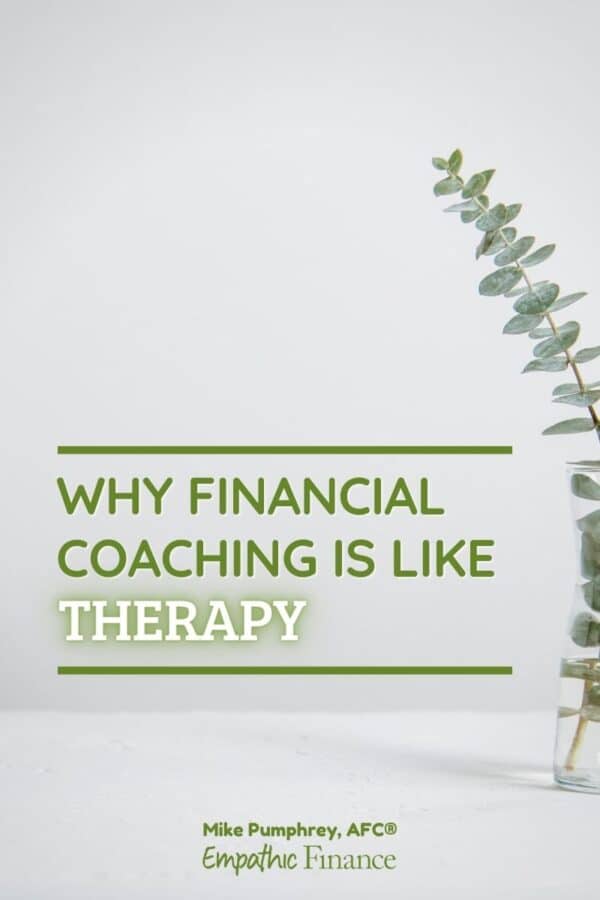The reasons why people seek out therapy and counseling are very similar to why we all would benefit from seeing a financial coach.
I don’t think I need to tell you that you could benefit from seeing a therapist.
I don’t mean this is any pointed way, it’s just that everyone could benefit from seeing a therapist.
Unless you’re above age 60 or didn’t grow up in a culture of therapy, you probably don’t need convincing on this take.
At the same time you are likely to need lots of convincing that you could also benefit just as much from seeing a financial coach. And you’re probably very skeptical on this point.
“Mike, why should I pay money for assistance when I’m struggling with money?”
And yes, I can answer that question in lots of different ways, but here’s the most straightforward:
“Because when you work with a financial coach, then you won’t be struggling with money anymore.”
That aside, it may be useful to look at the parallels between therapy and financial coaching, because there are many. And perhaps that might help you see that what might seem like a non-essential, possibly extravagant, expenditure about your financial challenges and growth, is no more lavish than seeing a professional about your personal challenges and growths.
Table of Contents
Reasons to go to therapy
The site GoodTherapy has a good definition of what therapy is, so I’ll quote it here:
Therapy, also called psychotherapy or counseling, is the process of meeting with a therapist to resolve problematic behaviors, beliefs, feelings, relationship issues, and/or somatic responses (sensations in the body). Beginning therapy can be a big step toward being the healthiest version of yourself and living the best life possible—no matter what challenges you may be facing. Through therapy, you can change self-destructive behaviors and habits, resolve painful feelings, improve your relationships, and more.
I’m not really sure I can better that in any way. “A big step toward being the healthiest version of yourself” feels more or less perfect.
Going to therapy with money
I’ve long said that your relationship to money is a relationship just any other in your life: your parents, your spouse, your friends, your children, your boss, etc. (Which is why you have a Money Attachment Style.)
And this relationship needs nurturing so that it can be the healthiest version of itself that it can be. (Oh, hey, interesting wording there.)
Goals of therapy
So let’s look at some of the goals of therapy, and see how they apply to your relationship with money. (Goals taken from here.)
- Better understand you emotions and where they are coming from. We all have beliefs around money (and about ourselves) that may not be helping us. Changing our programming around money will allow us to see opportunities when they happen, and have the confidence and skills to reach for them.
- Learn and practice using new, healthier methods of coping. From “retail therapy” to sheer avoidance, our spending and saving habits are not often addressed head-on to see if they are aligned with our present and future goals. Learning to build new habits around money (and not just “spending less”) can allow us to explore new responses to our environment, in a healthier way.
- Being more productive or working towards long term goals. Achieving financial success involves managing a tension between our needs of today and our needs of tomorrow. And all too often, the needs of tomorrow (retirement, savings, etc.) can fall by the wayside in favor of the needs of today. But it doesn’t need to be a zero sum game; it just involves getting clarity or our goals and our “why”, which will make working toward them much easier, and even intuitive.
- Improving communication of your feelings, wants, and needs. Communication means, in a sense, “action in the service of” our needs, and in a financial context, action in the service of our needs means taking steps towards making them happen. Working with a financial coach can help us understand our financial needs, and then take action on them in a direct, impactful way.
- Improving your self-esteem. If you’ve ever felt like you’re “not good with money” or that “you’ll always be poor” or any other of a variety of self-sabotaging beliefs, working with a financial coach can help replace those unhelpful beliefs with more accurate, more empowering truths, which will help you feel better about yourself.
- Figuring out what you need to live your best life. Money isn’t the cause of happiness, but utilizing money effectively can and will make all of our lives better. And a financial coach can help all of us figure this out.
It’s time to see someone
I’ve been in therapy for almost all of my adult life, and I credit it with helping me personally, relationally, and professionally.
And I believe we all could get the same level of help by seeing a financial coach. They can help all of us with better financial decisions that will make us happier, healthier, and—of course—wealthier as well.
You basically can’t afford not to.
You can find a financial coach on Find An AFC. (You can find me there too.)
And you can find a therapist on Therapy Den. (I’m actually there too, though not as a therapist.)



